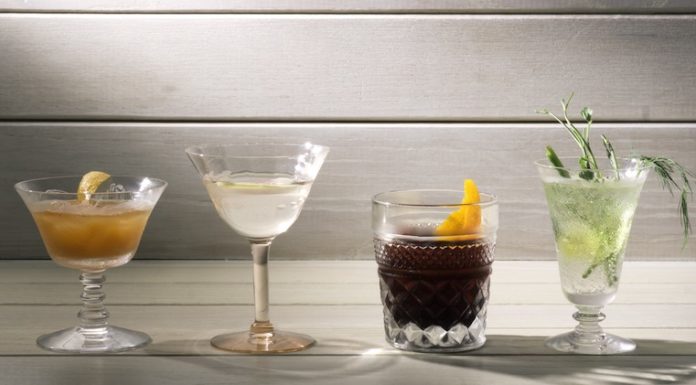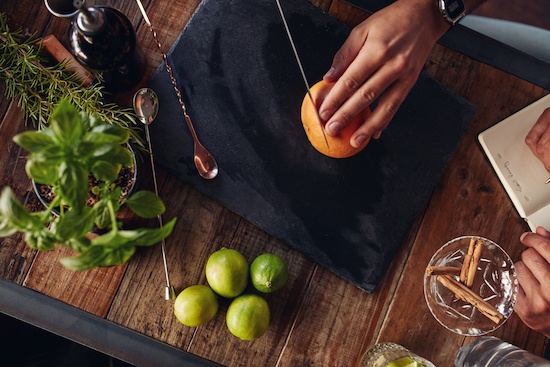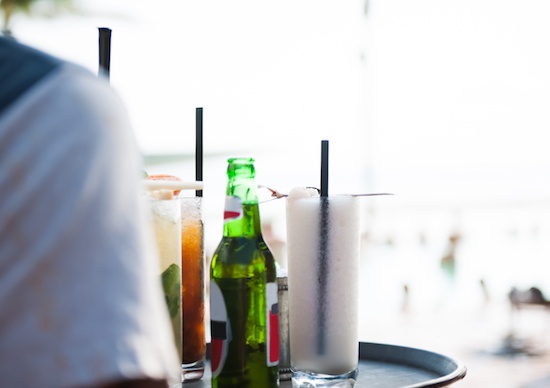More consumers today care about where products come from and how they’re made, as well as their impact on the environment. And for some bars and restaurants, carrying sustainable products and minimizing food waste are part of their core mission.
Fig + Farro in Minneapolis, for instance, serves all vegetarian and vegan food to combat climate change. Bartender Tyler Allen incorporates sustainable elements into his cocktails, including using organic ingredients and products such as Prairie Organic spirits.
Chicago cocktail lounge The Whistler has been taking sustainability seriously during the past year, says owner Billy Helmkamp. “Recycling in the bar environment—with such limited space and resources—has always been a hurdle for us in the past, so we’re trying improve our practices to be more green. That’s not easy in a fast-paced business like those of us in the service industry, but we do our best to recycle, whether it is bottles, cans or boxes.”
The Whistler also makes it a priority to source its bar with products from companies that do their part to make their own businesses more sustainable, Helmkamp says. “It may be a drop in the bucket, but we do what we can and want to work with those who feel that everyone has a role to contribute.”
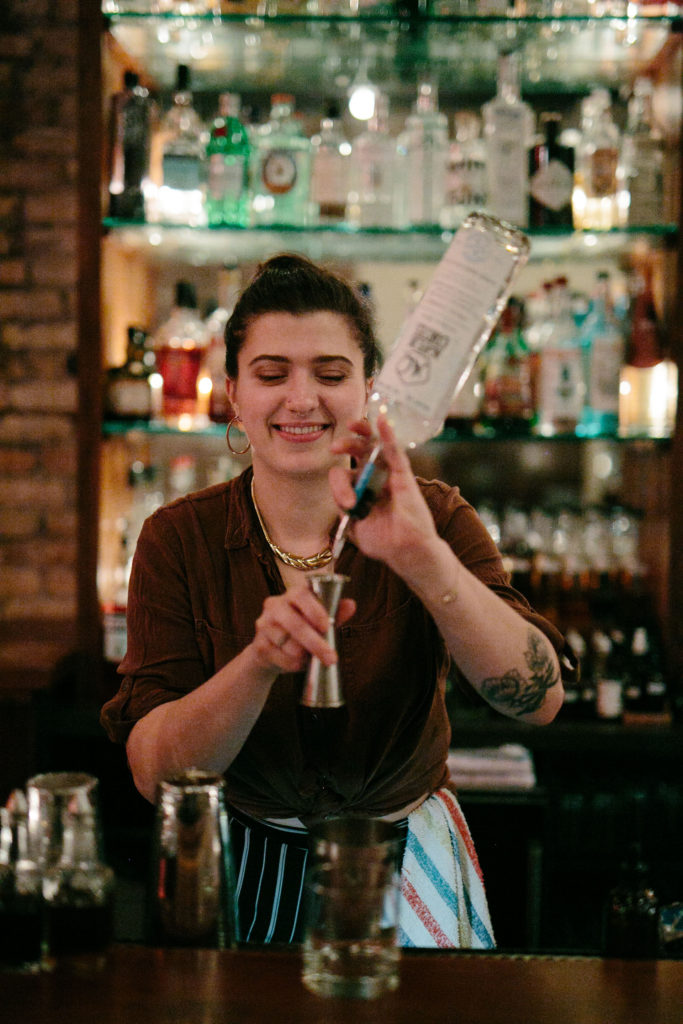
In fact, The Whistler’s head bartender Marina Holter has a list of criteria that she takes into account when creating drinks, from researching sustainable practices and the people/companies who are leading this charge in the beverage industry, to finding locally owned distilleries to support through meaningful partnerships. She considers the integrity of the partners/people/brands she works with before adding the spirit to her cocktails.
“A few brands are now offering carbon-negative implications to cocktailing,” Holter notes. “They do this by planting trees alongside general production, adhering to organic farming processes, using all the product throughout the means of distillation.”
Here are a few on-premise sustainability trends.
Low-waste F&B
At Daisies restaurant in Chicago, chef/owner Joe Frillman tailors the specific produce needs of the food and drink menu in part by collaborating with his brother, Tim, who owns and operates Frillman Farms in Prairie View, IL. Tim Frillman works with the culinary team on creative ways to increase the reach of compromised fruits and vegetables through fermentation, resulting in house-made and lacto-fermented sodas.
Chef Frillman’s inspiration for low-waste cocktails comes from the culinary traditions that are the foundation of the restaurant, namely using everything you can get flavor out of. Daisies launched the Imbibe Option cocktail flight (shown atop) this past summer. The flight includes four smaller cocktails, each with a different spirit and produce component: The Beet Old Fashioned (rye/beet/bitters); Night Vision (Campari/Carpano Antica/carrot and orange juices); Physician’s Friend (Letherbee gin, Suze, house herb scrap-verjus syrup, soda water); and Pretty Rad (mezcal/Cocchi Americano/celery root liqueur/verjus/radish).
Local and sustainable wine
Daisies general manager and wine director Keith Whitten has curated a Midwest-driven wine selection. His program shows locals (and tourists) that the Great Lakes Basin region can produce outstanding wine. All of Daisies white wines are Midwest-made, with an emphasis on diversity.
Delaney Oyster House in Charleston, SC, opened this past September by The Neighborhood Dining Group, offers a wine list inspired by marine-influenced terroir from around the world. The wine program focuses on growers and producers from regions either near or influenced by the sea, with sustainable, organic or biodynamic farming practices at work.
Organic wines are made from wines farmed organically and approved by the USDA, says Henri Marquis, sommelier/wine director at Café del Rey in Marina Del Ray, CA, while biodynamic wines are an effort to balance the entire vineyard with nature. Some guests have been asking for these types of wines, he notes.
“We currently carry a Gerard Bertrand Cigalus, a beautiful 50-50 blend of cabernet sauvignon and merlot grown at the biodynamically farmed Cigalus Estate,” he says. “It’s a full bodied wine boasting ripe black fruit flavors and supple tannins from Languedoc-Roussillon, France.”
Natural acid cocktail components
Bars and restaurants generated an estimated 571,000 tons of waste in 2018, according to ReFED, a nonprofit committed to reducing U.S. food waste. The biggest offender? Citrus ingredients.
As such, many bartenders seek ways to create sour flavors without the use of citrus and find acidity to balance drinks that extends beyond lemons and limes. These mixologists dabble with science to test various kinds of acidity made with citric acid, malic acid and lactic acid to decrease waste levels.
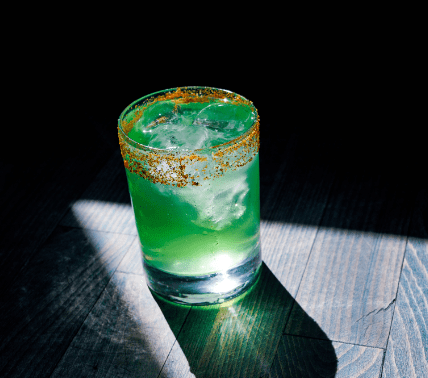
For example, at Pouring Ribbons in New York, bartender Brooke Harris uses citric acid mixed with Bombay Sapphire East gin in The Raid: Redemption cocktail. An acidified lime stock, made from boiling the husks and adding malic and citric acid to it, along with a small amount of sugar, delivers a kick to the cocktail, created by Harris and Pouring Ribbons partner Joaquin Simo.
Chris Morris, bartender at Houston’s MAD, experiments with a variety of acid components to modify classic cocktails without the staple citrus ingredient. His Mojito Claro cocktail combines white-tea-infused Havana Club rum with a summer herb (mint, tarragon, lemongrass) syrup with a lime-acid solution (citric/malic/tartaric). His Mellifera gin cocktail uses a lemon-acid solution (citric/malic/tartaric/phosphoric).
Along with purchasing “ugly” fruit from local farmers to flavor house-made kombucha, Daisies’ no-waste tactics include reusing ingredients to create shrubs and replacing citrus with other acids, such as kombucha, vinegar and verjus (grape juice).
Purging single-use plastic
“A big push in the food/dink industry right now is sustainability,” says Holter of The Whistler. “It is making conscious efforts to remove the excessive and make way for reducing and reusing. Small steps often make the biggest impact in this push.”
These might include eliminating straws or using eco-friendly straws (The Whistler uses straws made from hay), composting garnish and excessive products, appropriate recycling, reducing water-use behind the bar and making use of whole products when using produce.
Norwegian Cruise Line announced in September that it’s partnering with Just Goods to replace all single-use plastic bottles across its fleet by Jan. 1, 2020. The ships will carry Just Water, pure spring water packaged in a refillable and recyclable paper carton that’s made from trees grown in responsibly managed forests; the carton’s cap and shoulder are made from a sugarcane-based plastic.
The decision marks the latest effort driven by Norwegian’s Sail & Sustain Environmental Program, its commitment to minimize waste to landfills, reduce its CO2 emissions rate, increase sustainable sourcing and invest in emerging technologies. The 52-year-old cruise line in 2018 eliminated single-use plastic straws across its 16-ship fleet and private destinations. It expects the partnership with Just Water to replace more than 6 million single-use plastic bottles every year.

